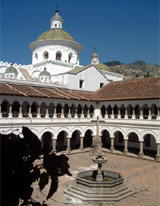Strengthening the automation of cultural heritage archives
14-04-2008 (Quito)

Convento de la Merced, Quito
© UNESCO
Within the framework of UNESCO’s Project "An E-Government Model for World Heritage Cities - Cartagena de Indias (Colombia), Quito (Ecuador) and Cusco (Peru)," launched by the Information for All Programme (IFAP) in 2006, the Organization is convening a workshop on "Documenting Technologies for Cultural Heritage Collections" in Quito, from 16 to 18 April 2008.
The workshop is one of the activities laid down in the agreement signed by UNESCO and the Municipality of the Metropolitan District of Quito, by which both entities collaborate in the introduction of an e-government concept in the management of this world heritage city. Similar agreements have been signed with the other two world heritage cities participating in the project, Cusco and Cartagena de Indias, where a similar training course has already been conducted.
The aim of the workshop is to gather the technical recommendations and points of view of the civil servants involved in different aspects of e-government transactions, such as professionals in charge of recording and cataloguing cultural goods of museums; those attending to the public; librarians; managers of information revenues, catalogues and archives; document-makers; and information analysts.
At the end of this training cycle, the recommendations and observations of the workshop participants from the three cities will be systematised and incorporated into the final edition of a Manual on Document Processing for Cultural Heritage Collections. This tool is expected to be of great use for the automation processes of documentation centres, libraries and archives in the three cities and to become a model for the entire Andean region.
The aim of the workshop is to gather the technical recommendations and points of view of the civil servants involved in different aspects of e-government transactions, such as professionals in charge of recording and cataloguing cultural goods of museums; those attending to the public; librarians; managers of information revenues, catalogues and archives; document-makers; and information analysts.
At the end of this training cycle, the recommendations and observations of the workshop participants from the three cities will be systematised and incorporated into the final edition of a Manual on Document Processing for Cultural Heritage Collections. This tool is expected to be of great use for the automation processes of documentation centres, libraries and archives in the three cities and to become a model for the entire Andean region.
Related themes/countries
· Colombia
· Ecuador
· Peru
· IFAP: News Archives 2008
· E-Governance: News Archives 2008
· E-Heritage: News Archives 2008
Share this story:














